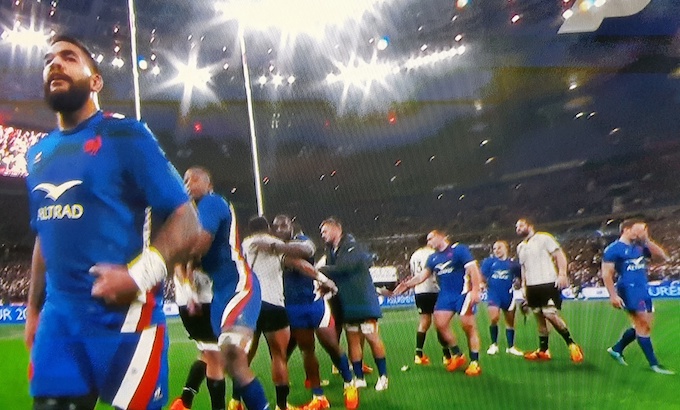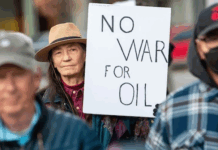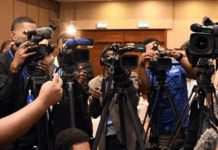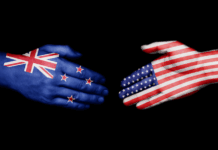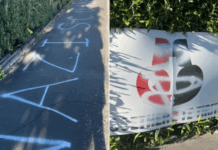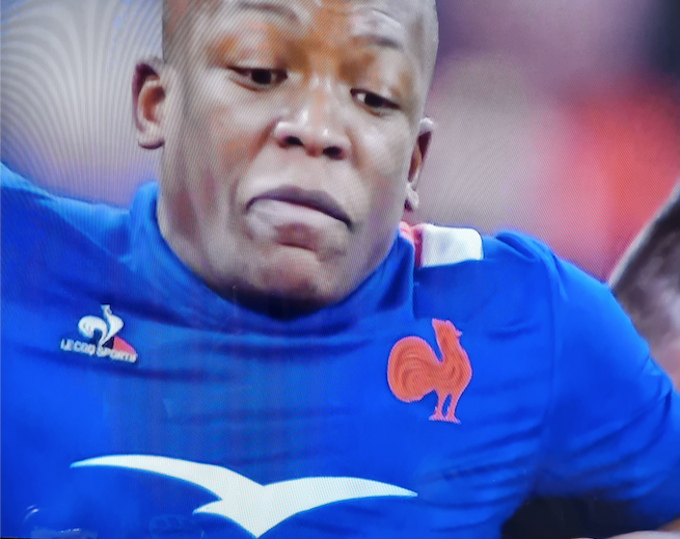
By Sri Krishnamurthi for Asia-Pacific Report
Both the INEOS and Altrad logos will be emblazoned on the All Blacks jerseys and shorts for the next six years from 2022 and critics say both are bound to tarnish New Zealand’s clean, green image.
Imagine, in the opening match of the 2023 Rugby World Cup both the All Blacks and France will be wearing the albatross-like Altrad brand, and both seeming to endorse a company that dabbles in worsening climate change.
Again, New Zealand Rugby (NZR) is on the wrong side history and flying in the face of environmentalists the world over who came together in Glasgow for COP26 earlier this month to labour the point that climate change is here right now.
- READ MORE: New protest slaps NZ Rugby over INEOS oil deal blow to Pacific
- Rugby: France demolish All Blacks 40-25 in Paris
- Très magnifique as fabulous French serve up telling lessons for All Blacks
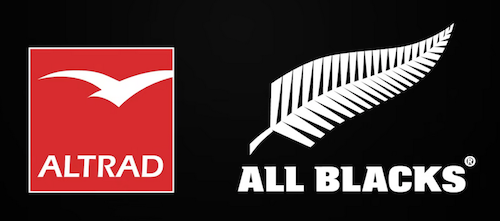
The All Blacks jersey will carry the Altrad logo which AIG has adorned for 10 years, and the back of the shorts carry the giant British petrochemical firm INEOS logo which is owned by James Ratcliffe who was valued by Forbes magazine as having $14.9 billion and 26,000 employees.
Who is Altrad? A quick search on your browser comes up with screeds of material virtually all positive about its owner Mohed Altrad, 73, a tale of rags-to-riches for the French-Syrian businessman who is valued at $3.3 billion, has 42,000 employees and is the owner of Montpellier Heralt Rugby club in the Top 14 elite.
What does Altrad do? “Altrad is a world leader in the provision of industrial services, generating high-added value solutions principally for the Oil and Gas, Energy, Power Generation, Process, Environment and Construction sectors. The Group is also a recognised leader in the manufacturing of equipment dedicated to the Construction and Building market,” according to its website, and that doesn’t mention the work it does at nuclear power sites.
However, Altrad either doesn’t participate or disclose to the Carbon Disclosure Project (CDP) which conducts disclosure from companies willing to engage with the project.

Combined deal worth $50m a year
For NZR the deal with Altrad is in excess of $120 million and $8 million from INEOS with the combined deal believed to be around $50 million a year.
“INEOS have been caught out at the far end of those who are being seen as not playing their part in climate change mitigation and obviously positioning themselves accordingly,” said former All Blacks captain Chris Laidlaw, one of 100 signatories on an open letter sent by Kiwis in Climate to NZR decrying the deal with INEOS last month.
“They will be thinking about it now because the fuss is erupting, there is not much more that I can say other than it is not a good look for New Zealand.
“It is not a good look that we are on the backfoot and up in the climate change stakes and the rugby union have to think about it in those terms that it all adds up to not being in their interests to go ahead with these is drawing a fairly longer bow.”
As a former All Black, Laidlaw in his public service career was also a tireless campaigner against apartheid which saw rugby on the wrong side of history once again.
In 1986, Laidlaw became New Zealand’s first resident High Commissioner to Harare, representing New Zealand’s interests throughout Africa. In 1989, Laidlaw was appointed Race Relations Conciliator.
‘A great shame’
“I’ve always thought the rugby union has been behind the play when it comes to social or political awareness, and they are showing it again now which is a great shame,” Laidlaw told Asia Pacific Report.
“If you asked most former All Blacks what they think about that, they are probably not going to give the answer you want, I just know that as a rule they are not connected with the political dimension we are talking about here.”
For Professor Dave Frame, director of the New Zealand Climate Change Research Institute at Wellington’s Victoria University and another of the signatories, it was a simple equation.
“I don’t see it as anything against New Zealand rugby, it is more as being about fossil fuel companies …I get why they spend money advertising in the motorsport industry, and they are enormously profitable companies,” he said.
“So, I think they are a bit like cigarette and alcohol companies sponsoring sport and these are things that we know to be harmful in one way or another to the environment.
“The All Blacks are a precious national brand and not just a company.
“Some of their own declared values, things like be a good ancestor, don’t really fit well in the 21st century being sponsored by a fossil fuel conglomerate.
Fossil fuel sponsorship ‘obsolete’
“Any fossil fuel sponsorship of a national rugby team it feels obsolete it feels like the sort of thing that it wouldn’t take much to decline. We shouldn’t be giving social licence to organisations which are actively causing one of the world’s greatest problems,” said Professor Frame who happens to be a Crusaders fan.
“If they’ve got spare money, they should stick that money into research and development into non-emitting energy technology rather than laundering their reputations via things like the All Blacks.
“That to me doesn’t feel right, I think it will be like turning up these days in a Rothmans or Benson & Hedges jersey or something like that.
“It is worse in some ways because people who are smokers choose to smoke like I say these are phenomenally profitable companies, you look at other sports like football.
“The champions league is probably one of the biggest annual sporting events in the world and champions league final, and they are sponsored by Gazprom and now the Saudis have bought Newcastle United [Saudi Arabia Public Investment Fund-backed consortium for £305 million] so they will be in there as well.
“These are profoundly profitable companies that are doing an enormous amount of environmental harm that is already being felt and it is disproportionately being borne by the poorest people in the world, and the leaders of these companies have this money to splurge on trinkets like football teams and rugby teams and that seems wrong,” Professor Frame said.
“I object to fossil fuel companies sponsoring sport in principle, I don’t have specific views on particular companies I don’t know of like Altrad although I do know a little bit about INEOS.
A place in motorsport
“They have their place like in the motorsport industry where they are encouraging more efficient design and that is a more arguable place, but I struggle to see the link between a fossil fuel company and rugby.
“We ought to have moved past it, and I think society will, I hope, soon withdraw its licence for this sort of reputational laundering,” said Professor Frame.
Laidlaw said he had looked at INEOS and thought they were not a good fit for NZR.
“They are not doing it for the betterment of rugby, I suspect therefore as seen as good citizens these companies choose their sponsorships arrangements very carefully and strategically, we all know that,” Laidlaw said.
The fact that they are a company that is intent now — right in the middle of when it’s very obvious we need a dramatic change in climate change management — buying up petrochemical plants around the world does not send the right signal.
“So, they are not a good partner. Any company that is in the middle of this kind of syndrome really does not warrant much attention as a donor or a partner.”
“It is very galling and a very large chunk of (rugby) supporters are really not much interested in climate change.
‘Pushback and backlash’
“Again, there will be some pushback and backlash but all the fuss in the world, once they have signed that agreement, they will just tough it out.”
What chance then of a court action, like that in 1985 when club players and lawyers Patrick Finnegan and Philip Recordon sought and gained an interim injunction that was granted by Justice Maurice Casey, stopped the All Blacks tour to South Africa.
“I was in the courts in 1985. I was astounded that the judge decided to provide an interim injunction, it was a very surprising decision given the law, it was a very good decision, and everyone was very pleased,” recalled Laidlaw.
“Well, not everyone, the Rugby Union was very displeased but on the same scale I would doubt it would, but you never know but it would be very interesting to see that happen.”
However, he doubted that such an action would take place with NZR’s deal with INEOS and Altrad.
“This is more an emotional thing than international law, there is nothing illegal about it, there is nothing in terms of human rights or anything like that. It is really not as compelling, I’m afraid.
“They might be moral companies but when it comes to climate change, they are missing the point.
Hard to persuade people
“Even then it is going to be quite hard to persuade people of the merits of this in terms of the argument being about climate change.”
The problem with climate change, he said, was people could not see the tangible effects of it in New Zealand.
“You can’t see climate change, you can see some of the side effects of it, but it is too big a thing for most people to comprehend.
“That is the fundamental problem, I’ve been through this as the chair of the regional council [Greater Wellington Regional Council] for some years and trying to get people from the farming community and others to actually convince themselves that they really have to be part of the solution is very, very hard, even now.
“We are getting some progress but dramatic action it is almost impossible to get, to persuade people. It is not in their material interest to move, and they won’t.
“There is only one side that you can be on this issue while it’s ephemeral to climate change, it is not a good look for New Zealand Rugby, and they are clearly going to be on the wrong side of history if they do it,” Laidlaw said.
- France completely dominated the All Blacks, winning 40-25 in Paris yesterday and handing New Zealand their second loss in row, and a third loss in a season for the first time since 2009. And, the Black Ferns were beaten by France as well, going down to them 29-7 in Castres to complete their tour losing all four tests to England and France. Their two years without playing a test because of covid-19 has seen the English and French steal the march on them ahead of next year’s Women’s World Cup in New Zealand.
